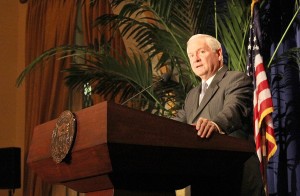Former defense secretary urges bipartisanship
Former United States Secretary of Defense Robert Gates spoke about foreign and domestic policy, including pressing national security challenges the United States currently faces, as part of the President’s Distinguished Lecture Series in Town and Gown on Wednesday evening.

Military man · Retired Secretary of Defense Robert Gates discusses foreign relations with Iran and China and their implications on diplomacy in a speech he gave at USC on Wednesday. – Ani Kolangian | Daily Trojan
Gates discussed the unstable relationships between the United States and several Asian and Middle Eastern nations, including China, Iran, Syria and Libya. He also emphasized the importance of bipartisanship in Washington to ensure that the government is effective in other aspects of policymaking and international relations.
“At a time when our country faces deep economic and other obstacles at home, in a world that just keeps getting more complex, the inability of political leaders to step outside of their partisan cocoons or to offend their most partisan supporters has become a threat to America’s future,” Gates said.
Gates, who wrote a memoir about his experience working under five presidents who all contributed to the end of the Cold War, said he believes consistency in political strategies will best accommodate the fundamental interests of both parties and the public. He noted that in his 46 years in Washington, success was most evident when there was continuity between different administrations.
“We need political leaders willing to rise above it all,” Gates said, emphasizing the importance of bipartisanship.
Gates served as secretary of defense under both President Barack Obama and President George W. Bush from 2006 to 2011. He is the only Secretary of Defense in United States history to be asked to stay in office by an incoming President. He also held the position of director of the Central Intelligence Agency from 1991 to 1993, and is the only officer in CIA history to rise from an entry-level position to director.
Gates said he hopes the winner of the upcoming election will place the majority of their focus on getting the country’s finances in order.
“Doing so would remove the pall that hangs over the American economy at home and American power and credibility overseas,” he said.
After his lecture, the former secretary answered questions from students in the audience.
When asked about the United States’ potential to pursue military action against Iran if diplomacy fails, Gates said all other options should be exhausted first.
“I had a view of both wars under two presidents, and frankly, I think in recent decades U.S. presidents have been too quick to reach for a gun to solve our problems,” he said.
Despite the many problems Gates discussed, he said he is confident that the United States will rise above the issues at the forefront of American politics.
“I still remain fundamentally optimistic about the future of this country,” Gates said. “Even though the United States faced enormous obstacles, most of them are self-inflicted, and we also have the power and the means to overcome them, as Americans have in the past.”
He also expressed positivity to those in the audience who hope to go into public service. Gates advised students to ignore those who tout the corruption of government.
“All I can say is do it. You read about the difficulties but what they don’t write about is how much satisfaction there is, how much joy there can be,” he said. “At the end of the day, most who go into [public service] are optimists and romantics who believe we can make a difference.”
